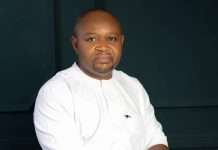(By Temitope Obayendo)
Experts from the Stroke Action team in the UK and Nigeria have described stroke as a critical health condition that be easily avoided by adopting a lifestyle that promotes good health and longevity of life.
The experts, who converged at the stroke awareness seminar organised by the Men’s Fellowship (Heart of David) of Rose of Sharon Parish, Redeemed Christian Church of God (RCCG), Ikeja, said stroke is a major problem in Nigeria because about 700,000 people suffer from it annually.
Fielding questions from journalists at the event, Dr Biodun Ogungbo, consultant neurosurgeon, Stroke Action UK, said the essence of the seminar was to enlighten people on the meaning, prevention and risk factors of stroke, as well as steps to take, if somebody has the ailment.
“Stroke is not caused by evil spirits nor by your enemies. It is caused by lack of blood supply to the brain. It is the same thing as heart attack, where there is no blood supply to the heart. The main risk factor of stroke is hypertension, known as high blood pressure. Other risk factors include: diabetes, sickle cell disease, obesity, etc. Thus, stroke occurs as a failure of the individual person doing the right things to prevent it,” he said.
On the necessary steps to prevent the condition, Dr. Ogungbo noted that it is important for the obese to lose weight and avoid smoking, while the hypertensive must always check their blood pressure, as hypertension requires constant monitoring and management.
In addition, he said: “If you are diabetic, control your blood sugar level, and if you have a heart disease as well, you need to take drugs, as prescribed by your health care givers.”
Head of the team and founder of Stroke Action, UK, Mrs Rita Melifonwu, explained another interesting aspect of the seminar, which was to educate the participants on how to ascertain the possibility of stroke when they see someone slump or faint suddenly. Introducing the “FAST” test, she said there are four things to watch out for in such circumstances – the face, the arm, the speech, and the time.
“When you see someone that faints on the road, you can test him to know if he has stroke. It’s about looking at the person’s face, to know whether there is any shift in his mouth when he speaks; to see whether there is any change in his arm stretch; to see if there is any change in the way the person acts. If that is the case, then we can take the person to the hospital. It’s called the fast test. You look at the face, the arm stretch, speech and the ‘t’ stands for time, to act immediately. The test was developed in the UK,” she narrated.
She further explained that, if someone has a stroke, he can still lead a normal life, as long as the FAST test is quickly applied. She stressed that, while the individual may not be exactly the way he used to be – because stroke patients can sometimes have shortness of memory and weakness on their arms or legs – he can still go back to work, or become a dad or mum again.
Adding his own view, presiding pastor of the parish, Pastor Emeka Obiagbo, emphasised the need for individuals to maintain a healthy lifestyle, as that would go a long way in preventing incidence of stroke.
He said, “Although the medical personnel are here, these things have to do with lifestyle. We need to watch what we eat, activities, and so on. If people are aware of these, they will begin to take precautions. Experiences have shown in this clime that some suffer, because they never monitored their health.”
He therefore advised that people go for regular check up, saying gone are the days of relying on self-medication, while dying in silence.










